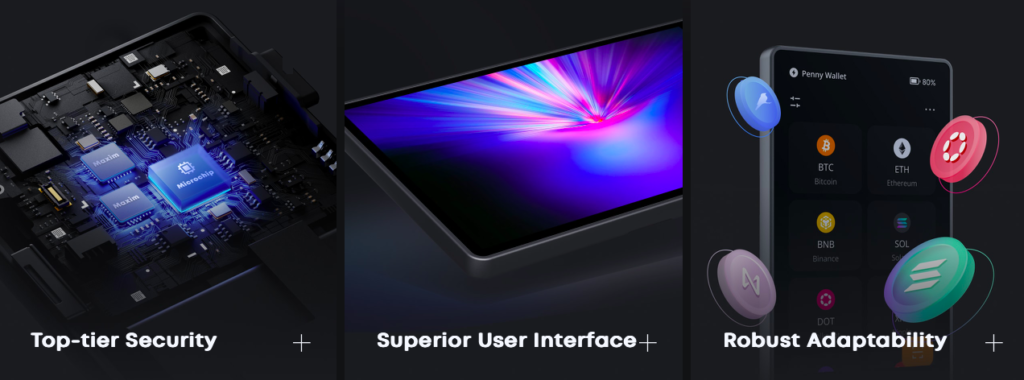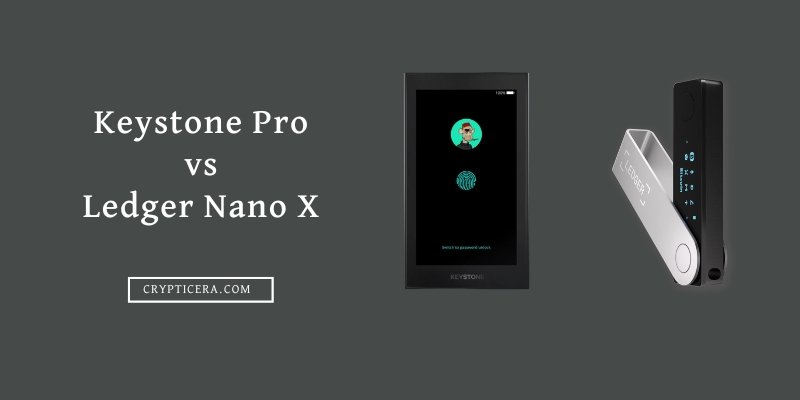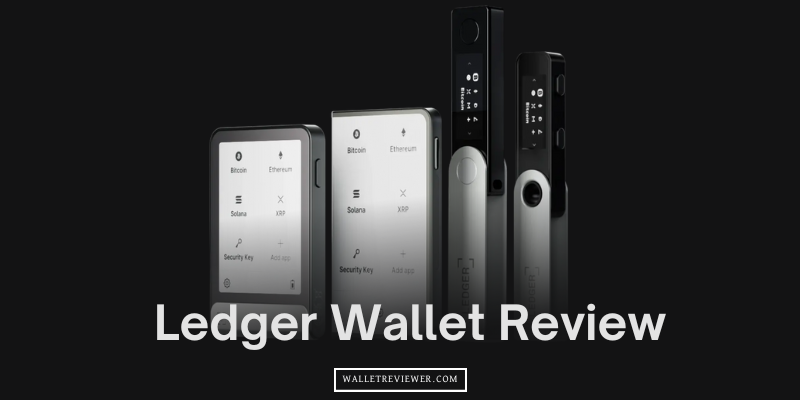Hardware wallets have emerged as a robust solution, providing offline storage and protection against online threats.
In this article, we’ll delve into the features, functionalities, and unique offerings of Keystone Pro vs Ledger Nano X, helping you make an informed decision on which wallet aligns best with your crypto needs.
Key Takeaways:
- Keystone Pro has a big 4-inch Ultra-high-resolution Color LCD touchscreen and a fingerprint scanner, while Ledger Nano X has a small Monochrome LCD display and two buttons. The Pro uses QR codes to connect to your phone, while the Nano X uses Bluetooth or USB cable.
- Keystone Pro can work with more than 40 blockchains and 5,500 tokens, while Ledger Nano X can work with 27 blockchains and over 500 tokens using its Ledger Live mobile app.
Keystone Pro vs Ledger Nano X: Hardware Wallet Comparison
| Feature | Keystone Pro | Ledger Nano X |
|---|---|---|
| Launched date | 2018 (formerly Cobo Vault) | 2017 |
| Price | $139 | $149 |
| Screen | 4-inch touchscreen | 128 x 64 pixels OLED screen |
| Weight | 115 g (without batteries) | 34 g |
| Build Quality | Fiberglass | Brushed stainless steel and plastic |
| Operating System | Android based | BOLOS (custom built) |
| Buttons | ✗ | 2 buttons |
| Communication | QR code (air-gapped) | USB-C and Bluetooth |
| Battery | 4*AAA or rechargeable battery | Lithium-ion 100mAh battery |
| Secure chip element | CC EAL5+ | CC EAL5+ |
| Compatibility | 25+ software wallets | 50+ software wallets |
| Supported coins and tokens | 5,500+ | 500+ with Ledger Live 5000+ with 3rd party wallets |
| Security features | fingerprint scanner, Shamir backup, Self-destruct mechanism, PIN code | PIN code, Ledger recover (optional) |
| Supported NFTs | ✔ | ✔ |
| Open source | ✔ (firmware only) | ✗ |
| Multi-sig | ✔ | ✗ |
| Built-in Buy and swap | ✗ | ✔ |
| Staking | ✗ | ✔ |
| Web3 compatible | ✔ | ✔ |
| Eliminate blind signing | ✔ | ✗ |
| Physical attack countermeasures | – Passphrase – Anti-tamper mechanism – PCI-level safe house | Passphrase |
| Advanced features | – Multi-Signature – Shamir Backup – Dice Entropy – ENS support | Ledger Recover (subscription-based service) |
Read our detailed review of both cold wallets:
Comparison between Keystone Pro and Ledger Nano X hardware Wallets
1. Keystone Pro vs Ledger Nano X: Security Measures

Keystone Pro and Ledger Nano X are both crypto hardware wallets. They use a secure chip (CC EAL5+) to keep your keys safe. But they have some differences in security.
- Air-gapped: Keystone Pro talks to your phone or PC with QR codes. It does not need internet or cable. This makes it very hard to hack or infect. Ledger Nano X uses USB-C or Bluetooth. This may have some risks.
- Fingerprint scan: Keystone has a fingerprint scan. You can use your finger to unlock and confirm. This is more secure and easy. Ledger X does not have this. You need a PIN code and two buttons.
- Shamir backup: Keystone Pro can split your recovery phrase into parts. You can store them in different places. You can get your wallet back even if you lose some parts. The Nano X does not have this. You need to keep your 24-word phrase whole and safe.
- Self-destruct: Keystone Pro can erase all data if someone opens it. This stops anyone from getting your keys. Ledger Nano X does not have this. But it has a secure chip that protects your data from physical and supply chain attacks.
- BOLOS: Ledger Nano X has a better custom-built operating system named BOLOS, while Keystone Pro uses traditional open-source Android version OS.
Winner: Keystone Pro takes the lead in security measures over Ledger Nano X due to its air-gapped connectivity, self-destruct mechanism, and Shamir backup.
2. Ledger vs Keystone Pro: Supported Coins
Keystone Pro supports more than 5,500 coins and tokens including ERC-20 and BEP-20, whereas Ledger Nano X supports 500 coins with the Ledger Live app and 5,000 more tokens with 3rd party online wallets such as MetaMask, Exodus, and Atomic wallet.
| Category | Keystone Pro | Ledger Nano X |
|---|---|---|
| Bitcoin (BTC) | ✔ | ✔ |
| Ethereum (ETH) | ✔ | ✔ |
| ERC20 | 5500+ | 500+ |
| Ripple | ✔ | ✔ |
| Polkadot | ✔ | ✔ |
| Solana | ✔ | ✔ |
| Cosmos | ✔ | ✔ |
| Binance Coin (BNB) | ✔ | ✔ |
| Tron | ✔ | ✔ |
| EOS | ✔ | ✔ |
| Monero | ✔ | ✔ |
Winner: Keystone Pro supports more crypto assets compared to Ledger wallets.
3. Keystone Pro vs Ledger X: Software Wallet Integration
Keystone Pro supports more than 25+ external software wallets, whereas Ledger devices are compatible with 50+ Bitcoin hot wallets.
| Software Wallet Compatibility | Keystone Pro | Ledger Nano X |
|---|---|---|
| MetaMask | ✔ | ✔ |
| MyEtherWallet | ✗ | ✔ |
| Solflare | ✔ | ✗ |
| Guarda wallet | ✗ | ✔ |
| OKX | ✔ | ✗ |
| Binance DEX | ✗ | ✔ |
| Aptos wallet | ✔ | ✗ |
| AirSwap | ✗ | ✔ |
Winner: Ledger Nano X supports more software wallet integration than Keystone Pro wallet.
4. Ledger Nano X vs Keystone Pro: Design
- The Keystone Pro has a 4-inch touchscreen that allows you to interact with your crypto and NFTs in a user-friendly way. The Nano X has a 1.3-inch OLED screen displaying transactions and balances. The Keystone Pro has a higher resolution and a larger display area than the Ledger Nano X.
- The Keystone hardware wallet is made up of fiberglass, while the Ledger is made of brushed stainless steel and plastic. Both devices have a sleek and durable design that protects your private keys from physical damage.
- The Pro model weighs 115g without batteries and is 112mm x 65mm x 18mm. The Ledger wallet weighs 34g as well and has a size of 72mm x 18.6mm x 11.75mm. Ledger is more portable.
- The Keystone wallet can operate with 4*AAA or its own customized rechargeable battery, while the Ledger Nano X has a lithium-ion 100mAh battery that can last up to several weeks on a single charge. Both devices have a battery indicator on their screens to show you the remaining power level.
Winner: Keystone Pro is larger in screen, heavy, and has a better battery life compared to the Ledger Nano X crypto wallet.
5. Keystone Pro vs Ledger Nano X: Price
The Keystone Pro is priced at $169, whereas the Ledger Nano X costs $149. Despite a $20 variation in price, the Keystone Pro provides superior value due to its additional features such as two batteries, Shamir backup, a 4-inch touch screen, and 100% air-gap functionality. You can use our link to buy Keystone Pro for $139.
Winner: Ledger Nano X is more affordable than the Keystone Pro hardware wallet.
6. Keystone Pro vs Ledger Nano X: Mobile App & Firmware Update
| Feature | Keystone Pro | Ledger Nano X |
|---|---|---|
| OS compatibility | No desktop app | Windows 10+, macOS 12+, Ubuntu LTS 20.04 |
| Mobile app | Keystone Mobile App for iOS and Android | Ledger Live App for iOS (13+) and Android (9+) |
| Connectivity | Connects with QR code scan | Connects with Bluetooth or USB wire |
| Mobile features | Check balances, make transactions, manage NFTs, use Web3 apps | Same as Keystone Pro, plus install up to 100 apps and update firmware |
- To update the software of Keystone Pro, you need to get the software package from the official website, check the SHA256 checksum, copy the update.zip file to a MicroSD card, put the card into the device, and agree to the update on the screen.
- To update the software of Ledger Nano X, you need to use Ledger Live on your computer, connect your device with a USB cable, start the software update from the Manager section, and follow the instructions on the screen.
Final Thoughts: Which Should You Choose?
To sum up Keystone Pro vs Ledger, The Nano X is small and looks like a USB drive. It has a screen and two buttons. It can hold many coins and work with 100+ apps and devices. It can connect with Bluetooth and USB. It costs $149 and has a 2-year warranty.
Keystone Pro is big and looks like a phone. It has a touchscreen, a camera, and a fingerprint scanner. It does not connect with anything. This is very safe, but not very easy to use. It costs $139 and has a 1-year warranty.
Keystone Pro has some extra features that Ledger Nano X does not have. It has a bigger screen, a camera, a fingerprint scanner, and no cellular connection. These features make it more secure, clear, and handy for your crypto dealings. The Nano X also has some special features like a password manager and hidden wallets.
Related Posts:



